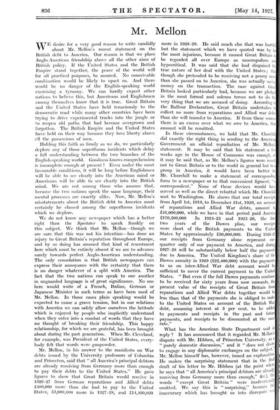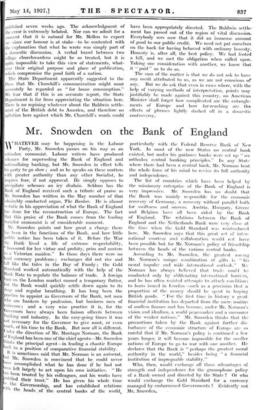Mr. Mellon
WE desire for a very good reason to write candidly about Mr. Mellon's recent statement on the British debt to America. Our reason is that we place Anglo-American friendship above all the other aims of British policy. If the United States and the British Empire stand together, the peace of the world will for all practical purposes, be assured. No conceivable combination would be likely to upset us. And there would be no danger of the English-speaking world exercising a tyranny. We can hardly expect other nations to believe this, but Americans and Englishmen among themselves know that it is true. Great Britain and the United States have held tenaciously to the democratic road while many other countries have been trying to drive experimental tracks into the jungle or to reopen old paths that had become overgrown and forgotten. The British Empire and the United States have held on their way because they love liberty above all the possessions of men.
Holding this faith as firmly as we do, we particularly deplore any of those superfluous incidents which delay a full understanding between the two branches of the English-speaking world. Goodness knows comprehension is incomplete enough at present ! Even under the most favourable conditions, it will be long before Englishmen will be able to sec clearly into the American mind or Americans will be able to see clearly into the British mind. We are not among those who assume that, because the two nations speak the same language, their mental processes are exactly alike. Now, Mr. Mellon's misstatements about the British debt to America must certainly be classed among the superfluous incidents which we deplore.
We do not know any newspaper which has a better right than the Spectator to speak frankly on this subject. We think that Mr. Mellon--though we are sure that this was not his intention—has done an injury to Great Britain's reputation throughout Europe, and by so doing has aroused that kind of resentment here which must be entirely absent if we are to advance surely towards perfect Anglo-American understanding.
The only consolation is that British newspapers can express their annoyance with the certainty that there is no danger whatever of a split with America. The fact that the two nations can speak to one another in unguarded language is of great significance. No one here would write of a French, Italian, German or Japanese Minister in such terms as haYe been used of Mr. Mellon. In those cases plain speaking would be expected to cause a grave tension, but in our relations with America we can safely allow ourselves the latitude which is enjoyed by people who implicitly understand when they enter into a combat of words that they have no thought of breaking their friendship. This happy relationship, for which we are grateful, has been brought about during the past generation. When Mr. Cleveland, for example, was President of the United States, every- body felt that words were gunpowder.
Mr. Mellon, in his answer to the manifesto on War debts issued by the University professors of Columbia and Princeton, said that " all America's principal debtors are already receiving from Germany more than enough to pay their debts to the United States." He gave figures to show that Great Britain would receive in 1926-27 from German reparations and Allied debts £400,000 more than she had to pay to the United States, £3,000,000 more in 1927-28, and £14,400,000 more in 1928-29. He said much else that was hurtf but the statement which we have quoted was by f the most injurious, because it caused Great Britain t be regarded all over Europe as unscrupulous an hypocritical. It was said that she had disguised the true nature of her deal with the United States ; that though she pretended to be receiving not a penny more than she passed on to America, she was actually saving money on the transaction. The case against Great Britain looked particularly bad, because we are pledged in the most formal and solemn terms not to do the very thing that we are accused of doing. According to the Balfour Declaration, Great Britain undertakes to collect no more from reparations and Allied war debts than she will transfer to America. If from these sources there is an excess over what we owe to America, that amount will be remitted.
In these circumstances, we hold that Mr. Churchill did exactly the right thing in sending to the American Government an official repudiation of Mr. Mellods statement. It may be said that his statement a for weeks ago in the House of Commons was enough, or it may be said that, as Mr. Mellon's figures were issued not to Great Britain or to the world in general but to a group in America, it would have been better for Mr. Churchill to make a statement of corresponding form to a newspaper or to that convenient figment, " a correspondent." None of these devices would have served so well as the direct rebuttal which Mr. Churchill sent to Washington. He shows that our total receipts from April 1st, 1919, to December 31st, 1926, on account of reparations and Allied War debts, amount t £41,000,000, while we have in that period paid America £170,500,000 In 1924-25 and 1925-26, the first two years of the Dawes plan, our receipt were short of the British payments to the United States by approximately £50,000,000. During 1926-21 our receipts from Germany alone represent one quarter only of our payment to America, and during 1927-28 will be substantially below half the payments due to America. The United Kingdom's share of the Dawes annuity in 1929 (£22,400,000) with the payments to us on inter-Allied War debt account would be sufficient to cover the current payment to the United States. " But even if the full Dawes payments continue to be received for sixty years from now onwards, the present value of the receipts of Great Britain from reparations and Allied War debts together would be less than that of the payments she is obliged to make to the United States on account of the British War debt, assuming interest at 5 per cent. to be added to future , payments and receipts in the past and futu payments, and receipts to be discounted at the saint rate."
What has the American State Department said is reply ? It has announced, that it regarded Mr. Mellods dispute with Mr. Hibben, of Princeton University, as a " purely domestic discussion," and it " does not desire to engage in any diplomatic exchanges on the subject! Mr. Mellon himself has, howeVer, issued an explanation. He makes the surprising statement that in the final draft of his letter to Mr. Hibben (at the point where he says that " all America's principal debtors arc already receiving from Germany more than enough," &c.), the words " except Great Britain " were inadvertent"! omitted. We say this is " surprising," because the inaccuracy which has brought us into disrepute Iva' published seven weeks ago. The acknowledgment of the error is extremely belated. Nor can we admit for a moment that it is natural for Mr. Mellon to expect as—since our honour is at stake—to be contented with the explanation that what he wrote was simply part of a domestic discussion. A verbal brawl between two village churchwardens might be so treated, but it is quite impossible to take this view of statements, what- ever their original purpose and place of publication, which compromise the good faith of a nation.
The State Department apparently suggested to the Press that Mr. Churchill's communication might most accurately be regarded as " for home consumption." We fear that if this is an accurate report, the State Department is far from appreciating the situation here. There is no repining whatever about the Baldwin settle- ment of the British debt to America, and therefore no agitation here against which Mr. Churchill's words could have been appropriately directed. The Baldwin settle- ment has passed out of the region of vital discussion. Everybody sees now that it did an immense amount of good to our public credit. We need not pat ourselves on the back for having behaved with ordinary honesty. Honesty is, after all, the best policy. We had footed a bill, and we met the obligation when called upon. Taking one consideration with another, we know that it " paid" us to do so.
The sum of the matter is that we do not ask to have an3 merit attributed to us, as we arc not conscious of any. But we do ask that even in cases where, with the help of varying methods of interpretation, points may justifiably be made against this country, no American Minister shall forget how complicated arc the entangle- ments of Europe and how far-reaching arc the effects of phrases lightly dashed off in a domestic controversy.



























































 Previous page
Previous page